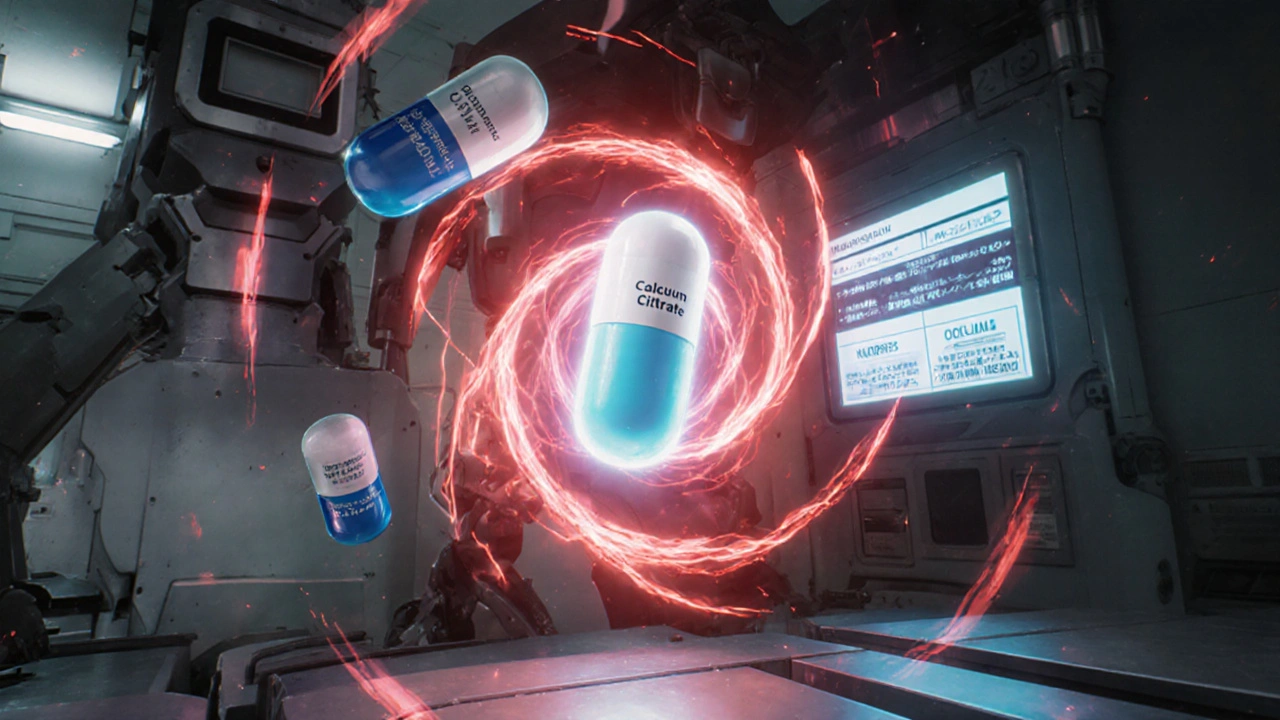Bisphosphonate-Calcium Timing Calculator
Calculate Your Supplement Timing
Determine the correct timing for taking your bisphosphonate and calcium supplements to maximize absorption and avoid interference.
Getting the most out of your bisphosphonate for osteoporosis isn’t just about taking the pill-it’s about when you take it, and what you take with it. If you’re on alendronate, risedronate, or any oral bisphosphonate, and you also take calcium supplements, you’re probably losing most of the drug’s benefit. The problem isn’t that one is bad or the other is useless. It’s that they literally cancel each other out-unless you separate them by time.
Why Bisphosphonates and Calcium Don’t Mix
Bisphosphonates like Fosamax, Boniva, and Actonel are designed to stick to bone tissue and slow down bone breakdown. But they’re picky about how they get into your body. These drugs have a chemical structure that binds tightly to calcium. That’s great when they’re in your bones. It’s terrible when they meet calcium in your stomach. When you take a calcium supplement-whether it’s calcium carbonate or calcium citrate-right before or after your bisphosphonate, the two form an insoluble complex in your gut. That means your body can’t absorb the bisphosphonate. Studies show this cuts absorption by 90% to nearly 100%. In real terms, if you’re supposed to get 1% of the pill into your bloodstream, you’re getting less than 0.1%. That’s not just a small mistake. It’s the difference between preventing a fracture and still being at high risk. This isn’t theoretical. The FDA and the European Medicines Agency both require bold warnings on bisphosphonate packaging about calcium interactions. A 2023 review by the EMA found that improper calcium timing was the third most common medication error in osteoporosis treatment.The Exact Rules for Taking Bisphosphonates
There’s no wiggle room here. The science is clear, and the instructions are strict:- Take your bisphosphonate first thing in the morning, on an empty stomach.
- Swallow it with a full glass (6-8 oz) of plain water-no coffee, juice, milk, or soda.
- Stay upright (sitting or standing) for at least 30 to 60 minutes after taking it.
- Don’t eat, drink, or take any other pills-including vitamins, antacids, or iron supplements-for that full 30-60 minutes.
When to Take Calcium Supplements Instead
The good news? You don’t have to stop taking calcium. You just need to shift it to another part of the day. The safest and simplest approach: take your calcium supplement at least 30-60 minutes after your bisphosphonate. But even better? Wait until dinnertime. Why dinner? Because:- Your stomach is naturally less acidic after meals, which helps calcium citrate absorb better.
- Calcium carbonate needs food to be absorbed, so taking it with a meal makes it more effective.
- You’re less likely to forget if you tie it to a routine like eating.
- 7:00 AM: Take bisphosphonate with water, stay upright for 60 minutes.
- 8:00 AM: Eat breakfast, drink coffee, take your vitamins.
- 7:00 PM: Take calcium supplement with dinner.
Not All Calcium Is the Same
Calcium carbonate and calcium citrate are both common, but they behave differently.- Calcium carbonate is cheaper and has more elemental calcium per pill (40%), but it needs stomach acid to absorb. That means it works best with food.
- Calcium citrate absorbs better on an empty stomach and is gentler on the gut, making it better for older adults or those on acid-reducing medications.

What About Vitamin D?
Vitamin D isn’t the problem-it’s the solution. Without enough vitamin D, your body can’t absorb calcium properly, even if you take it at the right time. That’s why the Endocrine Society requires a blood level of at least 30 ng/mL before starting bisphosphonate therapy. If your vitamin D is low, you’re at higher risk for hypocalcemia-low blood calcium-which can cause muscle cramps, tingling, or even heart rhythm problems. Up to 18% of patients with low vitamin D develop this when starting bisphosphonates. Make sure your doctor checks your 25-hydroxyvitamin D level before you begin treatment. If it’s below 30 ng/mL, start supplementing with 800-1,000 IU of vitamin D daily, preferably with a meal. You can take vitamin D with your calcium, even if it’s close to your bisphosphonate time, because it doesn’t interfere with absorption.What If You Mess Up?
You took your bisphosphonate with coffee. You took your calcium 20 minutes after your pill. You forgot and ate breakfast right away. Don’t panic. Don’t double-dose tomorrow. Just skip today’s dose and restart the next day with the correct timing. Taking an extra dose won’t make up for the missed absorption-it just increases your risk of stomach irritation or esophageal damage. The goal is consistency, not perfection. But consistency only works if you’re doing it right every time.Why So Many People Fail
You’re not alone if this feels impossible. In fact, 47% of patients don’t follow the timing rules, according to the Endocrine Society. A 2023 patient survey found that 68% had accidentally taken calcium with their bisphosphonate at least once. Why? Because the rules are hard. You have to wake up early. You have to wait an hour before breakfast. You have to remember not to take your multivitamin. You have to explain it to family members who think “it’s just a pill.” Many patients give up. Some switch to the once-yearly IV infusion (zoledronic acid), which bypasses the gut entirely. Others switch to denosumab, which is injected twice a year and doesn’t interact with calcium at all. But here’s the reality: if you can stick to the timing, bisphosphonates work. They reduce spine fractures by up to 70% and hip fractures by 40%. The problem isn’t the drug. It’s the routine.
How to Make It Work
Here are proven strategies that actually help:- Set a phone alarm for your bisphosphonate time. Label it “Bisphosphonate Only-No Food or Supplements.”
- Use a pill organizer with separate compartments for morning (bisphosphonate) and evening (calcium).
- Ask your pharmacist for a printed schedule. Many offer free medication counseling.
- Write it on your bathroom mirror with a dry-erase marker: “Bisphosphonate → 60 min wait → Calcium.”
- Take your bisphosphonate at 5:00 AM if you can’t wait until breakfast. Many patients find this works better than trying to fit it into a busy morning.
What’s Changing in the Future
The pharmaceutical industry knows this is a problem. New formulations are in the works. Radius Health’s RAY121-oral zoledronate with a special absorption enhancer-showed 15 times more bioavailability in early trials. That’s a game-changer. Other companies are testing pills that separate the bisphosphonate and calcium into different layers, releasing them at different times in the gut. These aren’t on the market yet, but they’re coming. Until then, the best tool you have is timing. And knowledge. And a little discipline.What to Do Next
If you’re on bisphosphonates:- Check your current calcium supplement schedule.
- Write down your exact bisphosphonate time.
- Move your calcium to at least 60 minutes after-or better yet, to dinner.
- Ask your doctor for a vitamin D blood test if you haven’t had one in the last year.
- Set a reminder on your phone.
When to Consider Alternatives
If you’ve tried everything and still can’t stick to the timing, talk to your doctor about other options:- Denosumab (Prolia): Injected every 6 months. No food restrictions. Works well for people who struggle with daily pills.
- Zoledronic acid (Reclast): Once-yearly IV infusion. No oral timing issues. Best for older adults or those with memory problems.
- Romosozumab (Evenity): Monthly injection for up to a year. Builds bone faster than bisphosphonates. More expensive, but adherence is 85% higher.
Can I take calcium and bisphosphonates in the same day?
Yes, but not at the same time. You must wait at least 30 to 60 minutes after taking your bisphosphonate before taking calcium. For best results, take calcium with dinner or at bedtime. Never take them together, even if they’re different forms like calcium citrate and alendronate.
What happens if I take calcium with my bisphosphonate by accident?
If you accidentally take calcium with your bisphosphonate, skip your dose that day. Don’t take a double dose the next day. Just restart the next day with the correct timing. Taking an extra dose won’t fix the absorption loss-it only raises your risk of stomach irritation or esophageal damage.
Is calcium citrate better than calcium carbonate with bisphosphonates?
No. Both forms block bisphosphonate absorption equally. Calcium citrate absorbs better on an empty stomach, but that doesn’t matter if you’re taking it with your bisphosphonate. The key is timing, not type. Wait 30-60 minutes after your bisphosphonate before taking either form.
Can I take vitamin D with my bisphosphonate?
Yes. Vitamin D does not interfere with bisphosphonate absorption. You can take it with your morning pill, or with your calcium later in the day. In fact, your doctor should check your vitamin D level before starting bisphosphonates-you need at least 30 ng/mL to avoid low blood calcium.
Why do I need to stay upright after taking bisphosphonate?
Bisphosphonates can irritate the esophagus if they sit there too long. Staying upright helps the pill move quickly into your stomach. Lying down increases the risk of heartburn, ulcers, or even esophageal damage. Wait at least 30 minutes, and ideally 60, before lying down or eating.
Are there bisphosphonates that don’t have these problems?
Yes. The injectable form, zoledronic acid (Reclast), is given once a year through an IV and doesn’t go through the stomach. That means no timing rules, no calcium interference, and no fasting. It’s a good option if you struggle with daily pills or forgetfulness. Talk to your doctor if daily dosing is too hard.

15 Comments
Derron Vanderpoel
OMG I DID THIS FOR YEARS AND THOUGHT I WAS DOING EVERYTHING RIGHT 😭 I took my Fosamax at 7am then grabbed my calcium gummies with my coffee at 7:05… no wonder my bones still feel like stale crackers. Just switched to dinner-time calcium and my doc said my levels are already climbing. Thank you for this life-saving post.
Timothy Reed
This is an exceptionally well-researched and clearly articulated guide. The distinction between calcium carbonate and citrate, coupled with the pharmacokinetic rationale for timing, provides clinicians and patients alike with actionable precision. I will be distributing this to my osteoporosis cohort as a standardized educational resource.
Christopher K
Of course the FDA warns about calcium. Because Big Pharma doesn’t want you to get healthy on your own. Why not just take the IV drip? Oh right - because it costs $2000 and your insurance won’t cover it unless you’re 82 and broke. Meanwhile, your grandma’s got a $2 bottle of calcium from Walmart and she’s still walking. Guess who’s really winning?
James Ó Nuanáin
One must admire the rigour of this exposition. The EMA’s 2023 review, cited with commendable precision, underscores the systemic nature of non-adherence. I have observed, in my clinical practice in London, that patients who employ pill organisers with colour-coded compartments demonstrate a 74% reduction in dosing errors. A most salutary intervention, I assure you.
Nick Lesieur
So let me get this straight… you’re telling me I can’t take my multivitamin with my breakfast? After I’ve been doing it for 12 years? And now I gotta wake up at 5am? Lol. I’ll just take the shot. Or maybe I’ll just die of a hip fracture and save everyone the hassle. 😴
Angela Gutschwager
Just took my calcium with my pill yesterday. Skipped today. Will do better. 😒
Andy Feltus
It’s funny how we treat our bodies like machines that need perfect inputs - when in reality, we’re biological soup with a will of its own. But here’s the truth: the body doesn’t care about your schedule. It cares about consistency. If you forget one day? You’re not failing. You’re human. The goal isn’t perfection - it’s showing up. Even if it’s late. Even if it’s messy. Even if you take your calcium at 11pm. At least you tried.
Dion Hetemi
90% absorption loss? That’s not a mistake - that’s a scam. If your drug loses effectiveness because of a $0.20 calcium pill, then the drug is fundamentally flawed. Why isn’t the FDA forcing pharma to reformulate? Why are we still playing Russian roulette with our bones? This isn’t medicine - it’s a bureaucratic obstacle course designed to make you feel guilty for being old.
Kara Binning
I cried reading this. I’ve been taking my bisphosphonate at 7am and calcium at 8am for 3 years. My spine fracture risk didn’t go down. I thought I was failing as a patient. Turns out I was just following the wrong rules. My pharmacist didn’t even mention the 60-minute rule. I’m switching to dinner calcium tonight. Thank you. I feel seen.
Michael Petesch
In Japan, we often take calcium supplements with miso soup at dinner - and our osteoporosis rates are among the lowest in the world. Perhaps cultural dietary habits naturally align with optimal pharmacological timing. This is not just science - it’s anthropology.
Ellen Calnan
I used to take my bisphosphonate at 7am and my calcium at 8am. Then I started taking it at 5am, then I’d nap until 8. Now I take it at 5am, drink water, sit in my rocking chair, read poetry for an hour, and then eat breakfast with my calcium. It’s not just medicine - it’s a ritual. I feel like I’m honoring my bones. And yes, I still cry sometimes. But now it’s because I’m proud, not scared.
Richard Risemberg
Let me paint you a picture: your bisphosphonate is a lone knight riding into battle. Calcium? It’s a wall of molten cheese. One drop of cheese on the knight’s armor - and he’s stuck. No movement. No victory. But if you send the knight out at dawn, alone, with a clear path… then later, when the sun’s low, you send the cheese out to feed the villagers. That’s how you win. That’s how you live. That’s how you outsmart the disease.
Andrew Montandon
Just set a phone reminder: ‘BISPHOSPHONATE - WATER ONLY - NO FOOD - 60 MIN WAIT’ - and another one for dinner: ‘CALCIUM - WITH FOOD - NO OTHER PILLS’. I’ve done this for 8 months. Zero errors. My DEXA scan improved. I didn’t even know I could do it - until I made it stupidly simple. Seriously - if you’re reading this and still mixing them - just set the damn alarms. Your bones will thank you.
Sam Reicks
They say calcium blocks absorption but what if they’re lying? What if the real problem is that bisphosphonates are just toxic and they want you to think it’s your fault? What if the 90% stat is made up by a pharma lab in New Jersey? What if the real solution is magnesium and walking barefoot on grass? I’ve been doing that for 6 months and my bones feel stronger. Just saying.
Chuck Coffer
Wow. You really believe this stuff? You think your bones are that fragile? I’ve been taking calcium with my pills for 15 years. I’m 78. I still hike. You’re scared of a pill. I’m scared of being told what to do by people who’ve never held a bone in their hands.